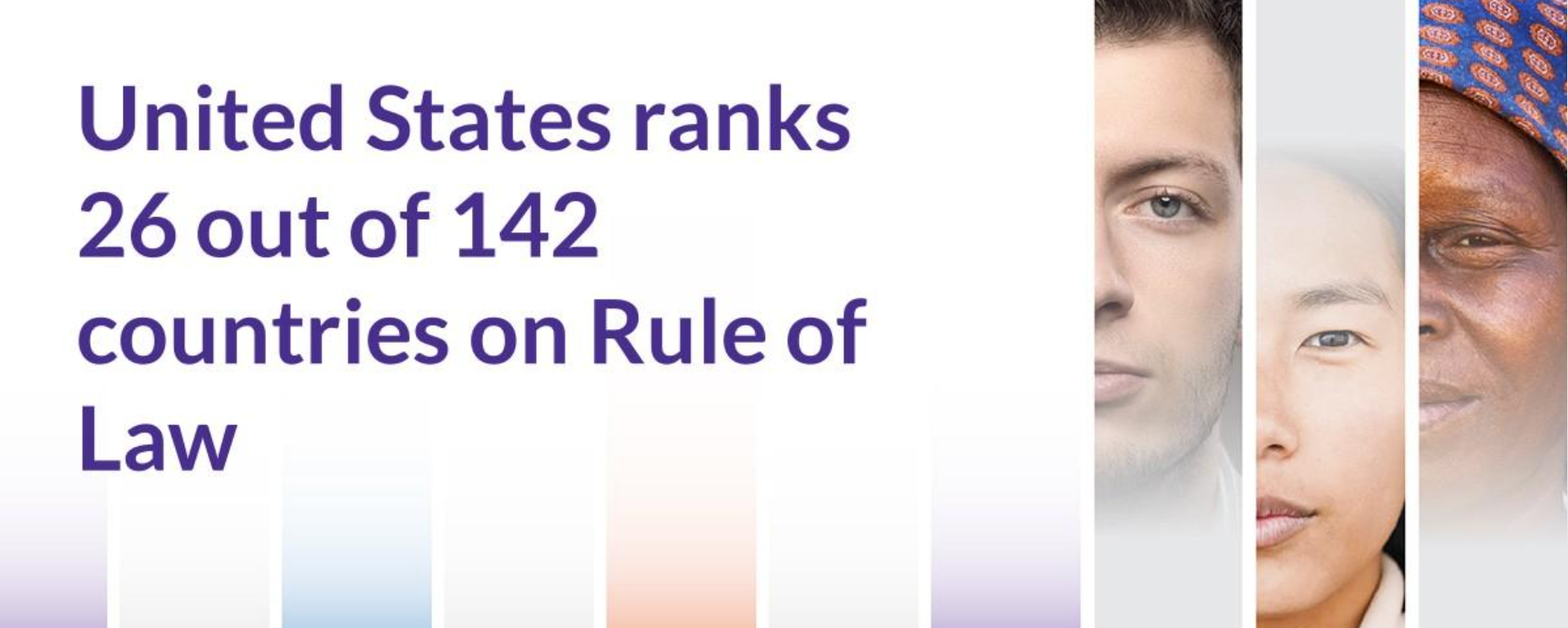

FOR IMMEDIATE RELEASE
MEDIA CONTACT: [email protected]
In the US, Weakened Rule of Law Persists
2023 WJP Rule of Law Index shows falling U.S. confidence in government accountability and criminal justice
WASHINGTON (Oct. 25, 2023) – The rule of law has once again eroded in a majority of countries this year, including the United States, according to the World Justice Project (WJP) Rule of Law Index 2023.
In 2022, following four consecutive years of declining rule of law, the United States was among the top improvers. Last year’s gains were not enough to overcome the long-term decline since 2016, however, and this year U.S. rule of law took a downturn again.
“Last year there was hope that a full rule of law recovery was under way,” said WJP executive director Elizabeth Andersen. “Unfortunately, the Index data highlights that U.S. checks and balances remain significantly weakened, while there’s been a worsening of longstanding problems with the justice system, such as discrimination, delays, and the significant obstacles people face in accessing or affording justice services.”
Overall, the U.S. ranks 26 out of 142 countries and jurisdictions on the rule of law, below the majority of other high-income countries.
Faltering confidence in government accountability remains an area of particular concern. The Index subfactor that examines whether government officials are sanctioned for misconduct is down 16% since 2016. This indicator declined again between 2022 and 2023, and the U.S. now ranks 36th globally on this Index subfactor.
“No one is above the law and the law is to be applied equally and fairly to everyone, regardless of power or position,” Andersen said. “These core rule of law principles are being put to the test in looming federal prosecutions of the former president and his co defendants, along with recent charges against a sitting U.S. senator and congressman. It remains to be seen where falling U.S. confidence in government accountability goes from here.”
Authoritarian trends slowing, but still an issue
With the advent of a global rule of law recession in 2016, the United States, like a majority of countries around the world, experienced authoritarian trends such as the weakening of checks on executive power from the legislative branch, the courts, and civil society, including the media.
Since 2016, the Index factor measuring Constraints on Government Powers in the United States has declined by 15% while the U.S. Fundamental Rights score declined by nearly 10%. Even as checks and balances remain significantly weakened, the biggest driver of rule of law declines in the United States in 2023 were problems in the criminal and civil justice systems.
Justice system challenges continue
This year, the U.S. rule of law downturn is in large part driven by declines in the criminal justice system. Almost every criminal justice subfactor measured by the Index grew weaker in the last year, with the timeliness of justice and the effectiveness of correctional systems declining the most. The U.S. score for Civil Justice also declined this year, exacerbating long-term weaknesses that distinguish the U.S. from the vast majority of high-income countries.
The U.S. ranks in the bottom 20% of countries in accessibility and affordability of the civil justice system (115 out of 142) and absence of discrimination in the civil justice system (124 out of 142) and ranks in the bottom 25% of countries in the impartiality of the criminal justice system (109 out of 142).
The poor performance of the U.S. justice system this year is not an anomaly.
Both the civil and criminal justice systems declined between 2016 and 2023, specifically the subfactors measuring impartiality of the criminal justice system and discrimination in the civil justice system – down 26% and 22% respectively.
“Overall, these findings underscore the need to build public trust in U.S. institutions,” said Andersen. “An independent judiciary plays an especially important role by constraining executive power, guaranteeing fundamental rights, and ensuring the justice system delivers on its promise of equal justice.”
GLOBAL RANKINGS
The top-ranked country in the 2023 WJP Rule of Law Index is Denmark, followed by Norway (2), Finland (3), Sweden (4), and Germany (5). The bottom ranked countries are Venezuela (142), Cambodia (141), Afghanistan (140), Haiti (139), and the Democratic Republic of the Congo (138).
Explore the full rankings and findings of the 2023 World Justice Project (WJP) Rule of Law Index at: http://www.worldjusticeproject.org/index/
###
- Access the complete 2023 Rule of Law Index and "Insights” booklet here.
- Find graphics (regional rankings, global rankings, and comparative maps) here.
- Find 142 country press releases organized by region here.
- MEDIA CONTACT & INTERVIEW REQUESTS: [email protected]
About the WJP Rule Of Law Index:
The World Justice Project (WJP) Rule of Law Index® is the world’s leading source for original, independent data on the rule of law. Now covering 142 countries and jurisdictions, the Index relies on more than 149,000 household surveys and 3,400 legal practitioner and expert surveys to measure how the rule of law is experienced and perceived worldwide. Published annually since 2009 and subject to a rigorous methodology, the Index is used by governments, multilateral organizations, businesses, academia, media, and civil society organizations around the world to assess and address gaps in the rule of law.
About the World Justice Project:
The World Justice Project (WJP) is an independent, nonpartisan, multidisciplinary organization working to create knowledge, build awareness, and stimulate action to advance the rule of law worldwide.
Effective rule of law reduces corruption, combats poverty and disease, and protects people from injustices large and small. It underpins development, accountable government, and respect for fundamental rights, and it is the foundation for communities of justice, health, opportunity, and peace.
The World Justice Project defines the rule of law as a durable system of laws, institutions, norms, and community commitment that delivers: accountability, just laws, open government, and accessible justice. Learn more about these four universal principles and our work at https://worldjusticeproject.org/.






